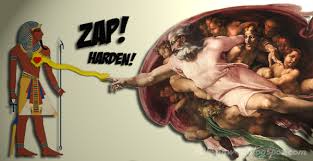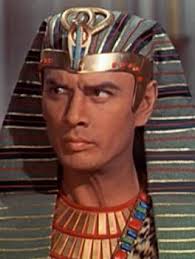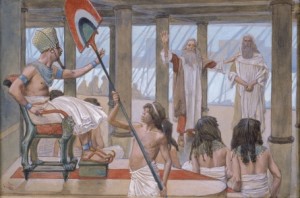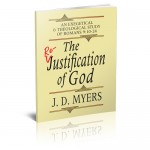 In Romans 9, Paul writes about the hardening of Pharaoh’s heart for the purposes of making God’s glory known. This seems rather harsh to some.
In Romans 9, Paul writes about the hardening of Pharaoh’s heart for the purposes of making God’s glory known. This seems rather harsh to some.
What does Paul mean?
Who Hardened Pharaoh’s Heart First?
In this debate, Calvinists say that God hardened Pharaoh’s heart first from eternity past because God needed a vessel of destruction through whom to reveal His wrath. They say that the text is quite clear in teaching that God hardened Pharaoh’s heart (Exod 9:12; 10:1, 20, 27; 11:10; 14:4, 8).
Non-Calvinists respond that in the Exodus account, the text frequently states that Pharaoh hardened his own heart before God hardened it (Exod 8:15, 32; 9:34). There are also several references which state that Pharaoh’s heart was hardened without giving indication about the source of this hardening (Exod 7:13, 14, 22; 8:19; 9:7, 35).
 But in response to this, Calvinists argue back that although the text says that Pharaoh hardened his own heart before God hardened it, before Moses even went to speak to Pharaoh, God told Him that He planned to harden Pharaoh’s heart (Exod 4:21; 7:3).
But in response to this, Calvinists argue back that although the text says that Pharaoh hardened his own heart before God hardened it, before Moses even went to speak to Pharaoh, God told Him that He planned to harden Pharaoh’s heart (Exod 4:21; 7:3).
As one is reading all the exegetical and theological arguments surrounding this debate about who hardened Pharaoh’s heart first, it begins to sound a bit like the question of which came first: the chicken or the egg.
It Doesn’t Matter Who Hardened Pharaoh’s Heart First!
Rather than summarizing all the exegetical and theological arguments on both sides of this debate, it seems best to avoid all the rhetoric and cut through to the main question which neither side seems to be asking.
The real question is this: “What does it mean for Pharaoh’s heart to be hardened?”
 The issue is not about who hardened Pharaoh’s heart first—though that is where most of the ink has been spilled—but rather about what it means for Pharaoh’s heart to be hardened.
The issue is not about who hardened Pharaoh’s heart first—though that is where most of the ink has been spilled—but rather about what it means for Pharaoh’s heart to be hardened.
People on both sides of the debate often assume that the hardening of Pharaoh’s heart means that Pharaoh was solidified in his status as an unregenerate person headed for hell.
But what if the hardening of Pharaoh’s heart doesn’t mean this at all? What if it simply refers instead to the resolve in Pharaoh’s heart to keep the Israelites as his slaves, and has absolutely nothing whatsoever to do with Pharaoh’s eternal destiny?
What if God, in His desire to make His glory known to both the Israelites and the Egyptians, made certain that Pharaoh would resist the will of God to deliver the people of Israel from Egypt, so that all those who witnessed and heard of these events would know that the God of Israel alone was God?
Could not God, in His gracious sovereignty, harden Pharaoh’s heart without affecting whatsoever Pharaoh’s ability to believe in God’s promises and thus become part of God’s redeemed people?
Of course He could!
Dr. J. Sidlow Baxter makes a similar point:
The awesome words to Pharaoh can be faced in their full force—“Even for this same purpose have I raised thee up, that I might show My power in thee, and that My name might be declared throughout all the earth.” The words “raised thee up” do not mean that God had raised him up from birth for this purpose: they refer to his elevation to the highest throne on earth. Nay, as they occur in Exodus 9:16, they scarce mean even that, but only that God had kept Pharaoh from dying in the preceding plague, so as to be made the more fully an object lesson to all men. Moreover, when Paul (still alluding to Pharaoh) says, “And whom He will, He hardeneth” (Exod 9:18), we need not try to soften the word.
God did not override Pharaoh’s own will. The hardening was a reciprocal process. Eighteen times we are told that Pharaoh’s heart was “hardened” in refusal. In about half of these the hardening is attributed to Pharaoh himself; in the others to God. But the whole contest between God and Pharaoh must be interpreted by what God said to Moses before ever the contest started: “The king of Egypt will not” (Exod 3:19). The will was already set. The heart was already hard. The hardening process developed inasmuch as the plagues forced Pharaoh to an issue which crystallized his sin. … Pharaoh’s eternal destiny is not the thing in question (Baxter, Explore the Book, VI:88-89).
This means that the hardening of Pharaoh’s heart, whether it is done by God or Pharaoh, or by some symbiotic combination of the two, has absolutely nothing to do with Pharaoh’s eternal destiny.
Even if the Exodus account laid all the responsibility for the hardening of Pharaoh’s heart upon God Himself, and none upon Pharaoh, this still would tell us nothing about whether or not Pharaoh concluded His life as one of God’s redeemed.
 Pharaoh’s eternal destiny is not under discussion in Exodus or in Romans, and so Pharaoh’s heart can be hardened so that God’s purposes are achieved, while still leaving plenty of room for Pharaoh to believe in God’s promises and become one of God’s people.
Pharaoh’s eternal destiny is not under discussion in Exodus or in Romans, and so Pharaoh’s heart can be hardened so that God’s purposes are achieved, while still leaving plenty of room for Pharaoh to believe in God’s promises and become one of God’s people.
If you want a longer and more detailed explanation of why God hardened Pharaoh’s heart, check out my new book: The Re-Justification of God.
If you want to read more about Calvinism, check out other posts in this blog series: Words of Calvinism and the Word of God.



God is not an ‘indian giver’ (if you’ll pardon the term). He gave us free will and, therefore, will not take it back. He can, and does, influence events in other ways to make the most of peoples choices. Being all powerful and all knowing, He is capable of using the ‘butterfly’ effect to affect great changes through the smallest interventions.
Right. He is not going to give us free will, and then when we use it in a way he doesn’t like, take it away from us. He knew what the gift of free will meant, and he gave it anyway.
I agree that the butterfly effect is one way God influences the course of world history and our lives.
Here is a GREAT explanation of what you two are talking about!
https://answersfromthebook.org/2011/01/20/did-god-harden-pharaohs-heart/
I also agree with this! Also, if you look at all times that the bible says that God will harden someone’s heart. Take Deuteronomy 2:26-30. It’s the same concept in mind. But what I pick up in Deuteronomy, look how his heart was hardened. A nice litter was sent to SihonKhing of Heshbon. In response, he hardened his heart. Even though God does bring out the desires of ones heart, he does it in a way of Love and peace offering. He did the same with the Egyptions. But as they refused each time, the consequence grew worse.
On a second topic, I know Jeremy that you ponder why God commanded his people to kill other nations. I am a believer that the punishment for the wicked is death, which is what God was exercising on the nations that were wicked. It is amazing how the whole entire bible fits together once you come to the realision that the punishment for the wicked is death. It makes sense why an animal had to die in place of a person as a sacrifice, it makes sense as to why Our Lord have himself as a sacrifice for our sins and undeservedly took our punishment (which was a painful and humiliating death)(what a loving Lord we serve!) it made sense why sodom and gomorah were killed. It makes sense why God banished Adam and Eve from the garden as to not allow evil to live forever. Check it out, it is quite eye opening!
Well if God hardened Pharaohs heart in eternity past then I guess He made the devil rebel as well. Hogwash. I wish some Calvinist would answer why do you accept this belief system just because you believe in the sovereignty of God doesn’t mean He doesn’t allow things to happen by its own accord
Ricky,
Yes, that is one possible ramification of believing that God hardened Pharaoh’s heart in eternity past. Of course, what you say about the devil is exactly what some Calvinists believe.
Are you kidding me? You mean that some Calvinists even believe that God is complicit in Satan’s rebellion? If God is a complicit, He’s responsible for all the troubles that come along with Satan’s rebellion. That’s my major problem with Calvinist. It seems like everything that happens God is somehow responsible for it. It’s kind of like that you’re dealing with a God who had programmed everything from the beginning, so to make them happen as planned, He influences both Satan and people to behave in such a way that will contribute to their fulfillment.
Jeremy if you want to hear a good sermon on this subject go to this website njbc.org click on sermon arches you want be disappointed I’m sure. This is old fashion Southern Baptist preaching by Dr. Herb Reavis Jr. of North Jacksonville Florida. You’ll lile him his not a Calvinist
I will check him out. Thanks!
Free will, as with free speech, is not truly 100% free. What one says or does is influenced in some way or another by the past, present and future. The term ‘hardening (or softening) of hearts’ relates more to influencing the influences rather than directly altering a person’s decisions or decision-making process.
Very true. Free will is a bad name for what God has given us. It is not fully free. Not by a long shot.
And as you point out, the “hardening” word is not good either. As you say, it relates more to the strengthening of resolve that was already there, or letting a person continue down the path of the course they have already chosen for themselves.
It is interesting if you look up the word in hebrew:
Amets which is can mean strengthen, establish, solidify, confirm, harden.
And with that it is not necessarily negative. Have a look in Ps 27:14 (God ‘amets’ your heart when you take courage (chazak)
Agreed. He doesn’t make our choices for us but He does influence them. Which leaves the aformentioned question. Why harden Pharaoh’s heart. One thought that comes to mind is that the plagues were giong to happen regardless of Pharaoh’s choices. Imagine the hebrews trying to travel under those conditions. (Just a thought)
Yes, God is a great influencer. It takes greater wisdom to influence the behavior of free beings than it does to simply control their every action.
Pharaoh wasn’t one of the “nones” (someone who ticks the ‘no religion’ box on a census). He wasn’t just a nice guy trying to do his best in a hard world. He had a national threat forced into a slave labour force, and he didn’t want to lose it.
The so-called hardening is more along the lines of Romans 1: Pharaoh preferred the lie to truth and God so gave him over to his own sin. While Pharaoh claimed to not know who this God was initially, he quickly found out, tried to bargain his way out of things, caved and reneged (several times), and eventually discovered the consequences of raging against God.
Did he repent at the end and worship the one true God? We’d all like to think it possible, but no one here knows.
Yes! Great point.
He wasn’t neutral in what was going on. He was facing the loss of his free labor, which held up his economy.
Also, I love the parallel to Romans 1. Very, very good point.
Another ramification of the idea that God hardened Pharaoh’s heart against his will is that all of the lives lost in the plagues that were ostensibly designed to soften Pharaoh’s heart – especially the first born children – were mere pawns in a cosmic gotcha. That is not how the God reflected in Jesus seems to me….
Agreed, that is a significant problem with that viewpoint. Those who wrote about Israel’s beginnings certainly never used the lens of Jesus to look at the stories they wrote. That God looks nothing like the God who came in the flesh. Could it be that they were writing what they supposed God looked like and what he did? Would this be the same God who sent Israel to slaughter men, women and children, the same God who drowned almost everyone on earth?
In my current project on the doctrine of election/predestination, I have also considered the position of Judas Iscariot, which could be regarded as a similar one. He was clearly described by Jesus as one of His twelve chosen ones (John 6:70; Gk eklegomai). Jesus referred to the twelve the Father had given Him again in His prayer (John 17:12) and it included Judas, whose destiny it was to be the son of perdition (or destruction). Once again there was a specific purpose; that the Scripture might be fulfilled. Scripture is not clear on the eternal position of Judas, who the Bible declares to have shown remorse and confessed that he had sinned (Matt 27:3).
What about when Jesus said “it were better if he had never been born?”
Thank you Jeremy, for the post on Pharaoh. I have never given thought to him in this way. Really stimulating.
God creates good and evil. – Isaiah 45:7
God deliberately sends people to hell on purpose. – Romans 8:28 – 32, Romans 9:1 – 23
There is NO such thing as free will. – John 15: 16, Ephesians 1: 4
Pharaoh’s heart was hardened because God ordained it that way. It was fixed to happen and it happened according to God’s will. It could not have happened any other way than it did. God only died for His, predestined elect family from eternity past.
The term hardened heart is an idiomatic term which actually means mind. The bible says that it is God who opens the mind via His Holy Spirit. It is God who chooses who is born blind or deaf (naturally abilities). It is also God who chooses who receives the spiritual ability to hear/discern his truth. – Proverbs 20:12
Phaorah died without mercy in His sin, because the living God ordained it to happen as such.
That is devil-worship. Read George MacDonald “On Believing Ill Of God”.
Read “Light: a sermon” by George MacDonald.
I knew what it meant whenthe Bible said that God was going to harden Pharaoh’s heart…I just don’t know why Godhad to have Moses almost threaten Pharaoh with the death of Pharaoh’s son.
My concern is this: it’s Pharaoh’s hard heart that led to the killing of the first born sons. You have another post trying to explain that God wasn’t really responsible for that killing. So…
Although Pharaoh’s eternal destination is not discussed in these text, it very much comes up as a question for me as well as other readers of scripture. I very much struggle with the idea of Pharaoh’s heart being hardened to show God’s power, especially because we see the people forget this and start to worship a golden-calf later in Exodus. I also struggle because:
1. Comparing Pharaoh to Saul/Paul – both were horrible in their own right. Sentencing God’s people to death. God intervened and hardened one’s heart while the other He physically met on a road and showed grace
2. God seems like a bully – after his first born was taken Pharaoh is defeated and broken. He tells Moses and Aaron to leave, take the Israelites and to worship God as they please. He also asked if they would bless him. HE ASKED FOR A BLESSING. Seems like this was finally over but God again hardened Pharaoh’s heart in 14:4 “But I will harden Pharaoh’s heart, and he will pursue them. But I will gain glory for myself through Pharaoh and all his army, and the Egyptians will know that I am the Lord”…Why? It seemed like they already knew. Pharaoh asked for a blessing and Egyptians were helping the Israelites, some even left with them.
3. Death of the first born – As stated above by Daniel, the killing of the first born seems excessive and brutal. I know Pharaoh before ordered the massacre of male babies but where is the love and grace? Also the eye for an eye passage in Matthew 5? There is no doubt that the hardening of Pharaoh’s heart led to the first borns being killed, so to me not only is Pharaoh’s eternal destination in question, that of the first born children are as well.
There are other things but I hope to have some conversation with people about these issues. Thanks!
I posted issues 1 and 3 in another comment.
For issue 2, my best shot is that although Pharaoh “said” he wanted God to bless him, in reality he only wants prosperity, blessing, and power. In other words, he stubbornly lets them go WITHOUT A CHANGE OF HEART. Although Pharaoh “said” he would let them go, in his mind he wants to get the Israelites back (like a child who is forced to forfeit his video games for a week).
Also, notice that the hardening of heart is after the Israelites turning back, so it’s likely that Pharaoh saw this as an opportunity to get them back.
If Pharaoh truly repented and had a change of heart, I wouldn’t think God would harden that heart.
For issue 1, note that Pharaoh was the initiator while Saul was simply tagging along with the rest of the Pharisees. It’s likely that Pharaoh rejected God when God tried to talk to Pharaoh early on.
For issue 3, my personal view may disagree with Jeremy Myers, but I believe that the children are being taken straight into heaven (since they are too young to decide). Also, in Exodus 8:18-19, the magicians knew about the plagues, so it’s likely that an average Egyptian will know what is going on by plague 5 or 6.
To those saying free will is not totally free. My answer is Job.
Sorry, I don’t follow. What about Job?